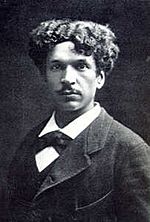Charles Cros facts for kids
Quick facts for kids
Charles Cros
|
|
|---|---|

Charles Cros
|
|
| Born | October 1, 1842 Fabrezan, Aude, France
|
| Died | August 9, 1888 (aged 45) Paris
|
| Nationality | French |
| Known for | poetry monologs Paleophone sound reproduction color photography methods fax transmission methods |
Charles Cros (born October 1, 1842 – died August 9, 1888) was a clever French poet and inventor. He was born in a town called Fabrezan, in Aude, France.
Cros was known for his funny poems and writings. As an inventor, he was interested in sending pictures over long distances using telegraph wires. He also worked on making photographs in color. But he is perhaps most famous for being the first person to think of a way to play back recorded sound. He called his invention the Paleophone.
Charles Cros passed away in Paris when he was 45 years old.
Contents
Early Life and Learning
Charles Cros was born into a family that loved learning. His father, Simon Charles Henry Cros, was a philosopher. His grandfather, Antoine Cros, was a grammarian, someone who studies language rules.
Charles also had two brothers. One was Henry Cros, who became a painter and sculptor. The other was Antoine-Hippolyte Cros, a surgeon.
In 1860, Charles Cros started studying medicine. But he soon decided to follow his true passions: writing and inventing.
Amazing Inventions
Charles Cros had many big ideas. He was ahead of his time in several areas of science and technology.
Pioneering Color Photos
Cros almost invented colour photography! In 1869, he shared his ideas on how to take pictures in color. He suggested taking three separate photos of the same scene. Each photo would use a different colored filter: green, violet, or orange.
Then, he explained how to combine these three pictures. By layering them with special colored inks, you could recreate the original colors of the scene. His ideas were very similar to those of another inventor, Louis Ducos du Hauron.
On the very same day, May 7, 1869, both Charles Cros and Louis Ducos du Hauron presented their color photography methods. They hadn't worked together or known about each other's research. Even though Cros had written down his ideas earlier, Ducos du Hauron had patented his method first.
Inventing the Phonograph
Cros also almost invented the phonograph, a machine that plays recorded sound. Before him, no one had figured out a practical way to play back sounds that had been recorded. He called his invention the 'Paleophone', which means 'voice of the past'.
On April 30, 1877, he sent a letter to the French Academy of Sciences in Paris. In his letter, he explained his idea. He described how a tiny needle attached to a vibrating surface could make a mark on a special blackened surface. This mark would be a recording of the sound waves.
He also explained that the process could be reversed. If you made the needle follow the mark, the vibrating surface would recreate the original sound. He thought a cylinder shape would be best for recording.
However, before Cros could build his machine, Thomas Alva Edison introduced his own working phonograph in the United States. Edison patented his method for playing sound on January 15, 1878. It seems that Edison and Cros didn't know about each other's work beforehand.
Mirror for Martian Messages
Charles Cros had a very imaginative idea about communicating with other planets. He believed that bright spots seen on Mars and Venus were lights from big cities on those planets. He thought they were high clouds lit by the sun, but he was convinced they were cities.
For years, he asked the French government to build a giant mirror. He wanted to use this mirror to send messages to Martians and Venusians. His plan was to burn huge lines onto the deserts of those planets using sunlight reflected from the mirror. He truly believed Martians existed and that his giant mirror could be built.
Creative Poetry
In the early 1870s, Charles Cros's poems were published in a weekly magazine called Renaissance littéraire et artistique. Other famous writers like Stéphane Mallarmé also contributed to this magazine.
One of his most famous poems is The Kippered Herring. This poem inspired a performer named Ernest Coquelin to create something new called monologues. These were short plays where one person performed alone. Many other performers copied this style.
More About Charles Cros
The Académie Charles Cros, a famous French music award group, is named in his honor. It's like the French version of the US Recording Academy.
Charles Cros was also part of a group of artists and writers called the Hydropathes. This group was active around 1878 to 1881.
He even appears as a character in the movie Total Eclipse. This film is about the lives of two other French poets, Paul Verlaine and Arthur Rimbaud. In the movie, Cros is shown briefly at a famous Paris café called Le Chat Noir, which was a popular spot for artists.
Marie Corelli, a writer from the 1890s, included one of his poems in her book Wormwood. She added a special note to show her respect for him after he had passed away.
See also
 In Spanish: Charles Cros para niños
In Spanish: Charles Cros para niños
- L'Académie Charles Cros
- Zutiste
 | Dorothy Vaughan |
 | Charles Henry Turner |
 | Hildrus Poindexter |
 | Henry Cecil McBay |

